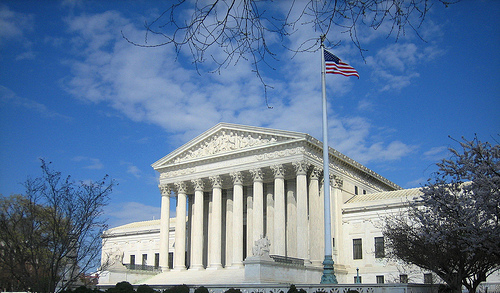You have no right to ask someone to commit a murder, obviously, but it’s hard to say if the First Amendment protects the right to extol or encourage murder – not just murder in general but the murder of a person, or class of people, in particular. Advocacy of violence is protected speech (prohibitions on advocacy inevitably restrict unpopular political speech, as early and mid 20th century red scares demonstrated.) Conversely, neither incitement to violence nor “true threats” of violence (”where the speaker means to communicate … intent to commit an act of unlawful violence to a particular individual or group …”) are, in theory, constitutionally protected; but, in practice, courts still struggle to define and distinguish between incitement, threats, and mere advocacy.
 The state courts of Texas will get another chance in a lawsuit filed by Michael Weinstein, founder of the Military Religious Freedom Foundation (MRFF) charging that imprecatory prayers (that Weinstein’s “days be few”) and “virulent” anti-Semitic “rants” against him constitute “terrorist threats,” proscribed by Texas law. Weinstein alleges that Elmer Ammerman, founder of the Chaplaincy of Full Gospel Churches (CFGC) and his associate, Gordon Klingenschmitt, issued an effective fatwah against him (along with Barry Lynn, executive director of Americans United for Church and State.) You can find the offending prayers, offered by Klingenschmitt, here. They include this plea:
The state courts of Texas will get another chance in a lawsuit filed by Michael Weinstein, founder of the Military Religious Freedom Foundation (MRFF) charging that imprecatory prayers (that Weinstein’s “days be few”) and “virulent” anti-Semitic “rants” against him constitute “terrorist threats,” proscribed by Texas law. Weinstein alleges that Elmer Ammerman, founder of the Chaplaincy of Full Gospel Churches (CFGC) and his associate, Gordon Klingenschmitt, issued an effective fatwah against him (along with Barry Lynn, executive director of Americans United for Church and State.) You can find the offending prayers, offered by Klingenschmitt, here. They include this plea:
“Let us pray. Almighty God, today we pray imprecatory prayers from Psalm 109 against the enemies of religious liberty, including Barry Lynn and Mikey Weinstein, who issued press releases this week attacking me personally. God, do not remain silent, for wicked men surround us and tell lies about us. We bless them, but they curse us. Therefore find them guilty, not me. Let their days be few, and replace them with Godly people. Plunder their fields, and seize their assets. Cut off their descendants, and remember their sins, in Jesus’ name. Amen.”
 Weinstein plausibly claims that as a result of Ammerman’s tirades and the curses rained upon him by Klingenschmidt, “threats and hate mail (against Weinstein and his family) have increased exponentially; (they) justifiably live in fear of imminent violence…”
Weinstein plausibly claims that as a result of Ammerman’s tirades and the curses rained upon him by Klingenschmidt, “threats and hate mail (against Weinstein and his family) have increased exponentially; (they) justifiably live in fear of imminent violence…”
This is not a simple case: The defendants can cite their religious freedom, as well as their free speech rights, in defense of their prayers. While they have no special religious right or license to threaten people, courts may well be less likely to find that a prayer constitutes an actual threat, which is sufficiently difficult to define anyway. People indulge in hyperbole, especially when riled. I knew someone who joked about taking a contract out on his mother-in-law. If simply uttering the words “I could kill you,” were a crime, we might have to stop locking up non-violent drug offenders. This prospect of punishing people for off-hand references to murder or imaginary hit lists may seem fanciful, but in post-Columbine, zero tolerance, bullying-sensitive public schools, for example, it’s not an uncommon practice. In Texas, in 2005, the Houston Press reported, a teenage girl was expelled from school for making a terrorist threat against a teacher, when she vented on an online chat room, calling the teacher “a bitch” and “a fat head” and adding “shez now the first person on my to kill list.”
 Maybe I’m naïve, but I doubt that this girl would actually have been convicted under Texas law, though I don’t mean to trivialize Weinstein’s concerns by mentioning this case. I do mean to point out the inevitable abuses of laws that punish speech. What constitutes a “terrorist threat” pursuant to the Texas penal code? It’s a threat uttered with “intent to place a person in fear of imminent serious bodily injury.” (Intent is a matter of fact, for juries and occasionally judges to determine, or infer; for an example of insufficient factual evidence of intent to threaten, under Texas law, see Jones v Texas.)
Maybe I’m naïve, but I doubt that this girl would actually have been convicted under Texas law, though I don’t mean to trivialize Weinstein’s concerns by mentioning this case. I do mean to point out the inevitable abuses of laws that punish speech. What constitutes a “terrorist threat” pursuant to the Texas penal code? It’s a threat uttered with “intent to place a person in fear of imminent serious bodily injury.” (Intent is a matter of fact, for juries and occasionally judges to determine, or infer; for an example of insufficient factual evidence of intent to threaten, under Texas law, see Jones v Texas.)
States may criminalize intentional threats, the Supreme Court confirmed in a 2003 case holding that cross burning (symbolic speech) may be criminalized if “carried out with the intent to intimidate” (but intent may not be inferred from the mere act of burning a cross.) So how might a judge or jury determine actual intent to threaten or intimidate? The law is confused: “True-threat jurisprudence remains a muddled mess,” David L. Hudson notes in a post for the First Amendment Center.
The 9th Circuit court of Appeals grappled with this mess in Planned Parenthood v. American Coalition of Life Activists, otherwise known as the Nuremberg Files case, in which the court ultimately upheld a multi-million verdict against an anti-abortion group sued for threatening abortion providers by posting their personal information on the Internet, (including names, addresses, and license numbers) and targeting them with “wanted posters.” Three of the named doctors were killed. (I supported this decision in a 2002 column, but I’m still not sure I was right. For a strong, contrary opinion, see this post by Ronald K.L. Collins and Robert Corn-Revere.)
So, at the risk of seeming like a ditherer (or serving as an example of why people hate lawyers) I could perhaps argue either side of Michael Weinstein’s case charging that, under the circumstances, imprecatory prayers directed against him and his family constitute intentional threats. But Weinstein’s intention or expectations in filing this lawsuit are unclear. His complaint, posted on his website, reads more like political than legal advocacy: “MIKEY TAKES ON THE RELIGIOUS FRONT PUT UP BY THE DEFENDANTS,” one paragraph heading declares. And, if it’s easy to sympathize with Weinstein and his family, whose fears of violence don’t seem unfounded, it’s hard to imagine a ruling effectively punishing people for asking God to smite their enemies — a ruling that could chill quite a lot of religious speech indeed.
Wendy Kaminer is an American lawyer and writer. She will be speaking at the panel “Rethinking freedom in an illiberal age” at the Battle of Ideas at 1530 on Saturday 31 October, with Jo Glanville, Mick Hume and Anthony Barnett.
Find original story here or on Index on Censorship


